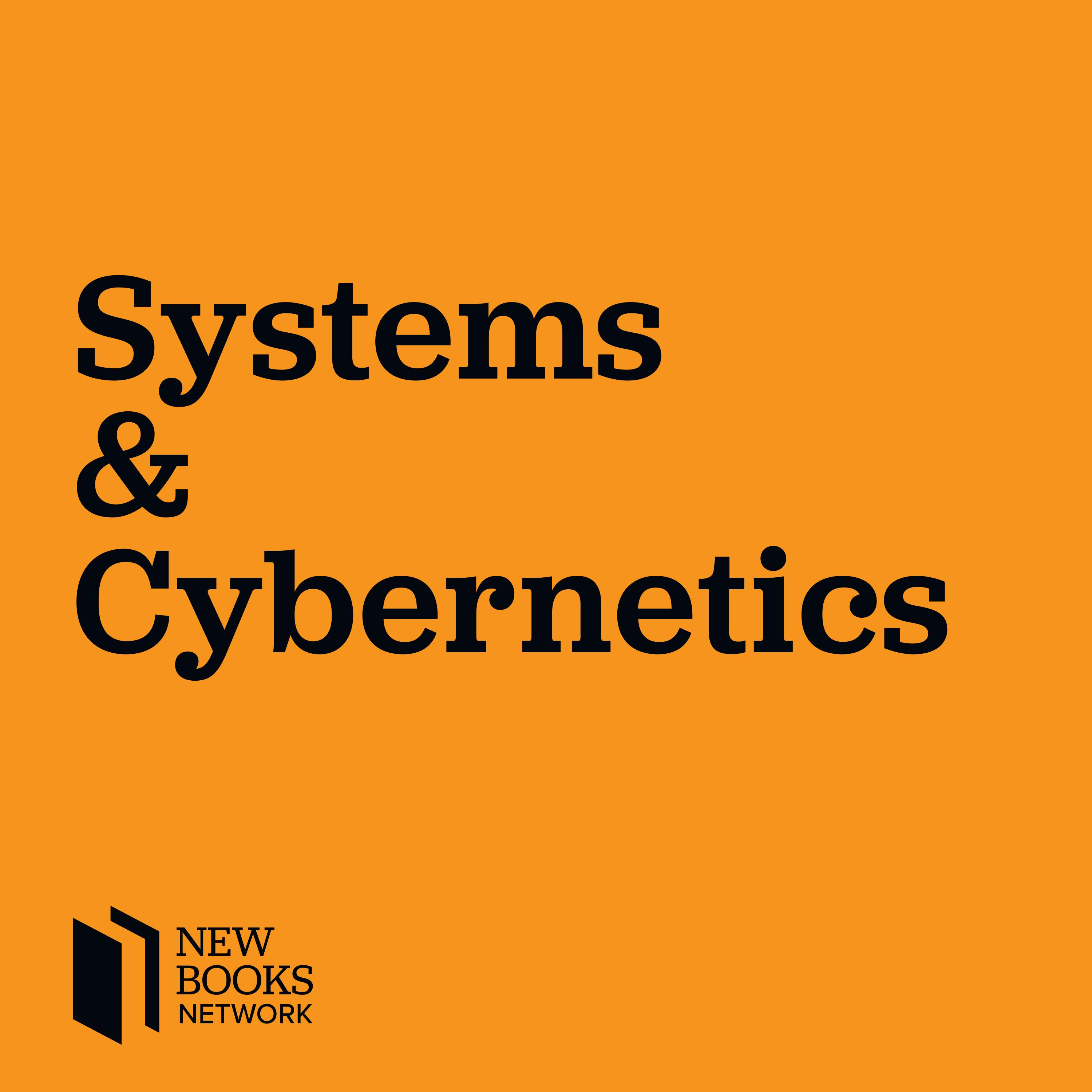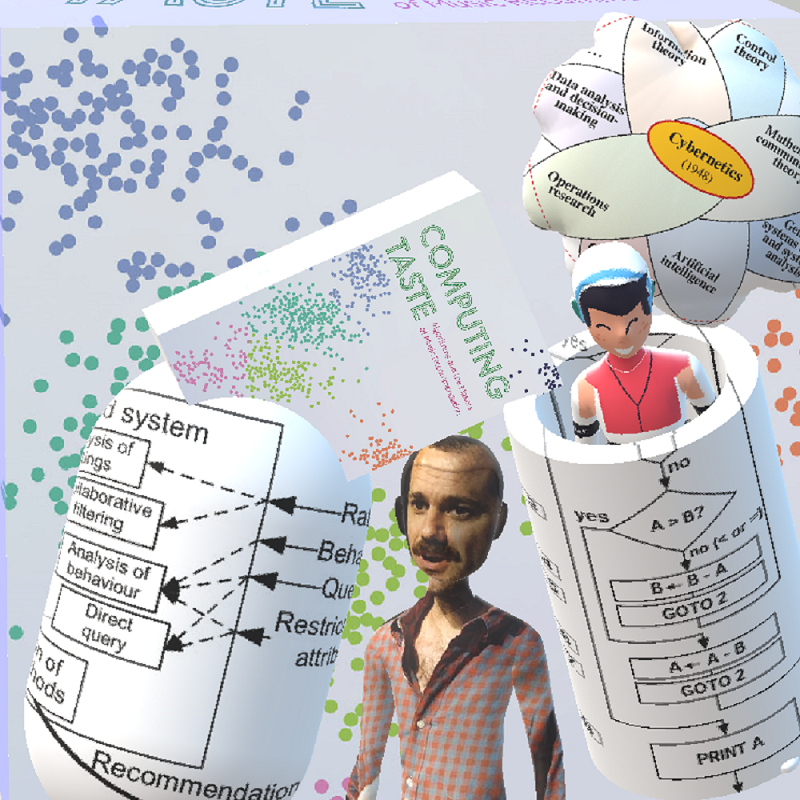Shows
 New Books in CommunicationsComputer GraphicsIn this episode of High Theory, Bernard Dionysius Geoghegan talks with us about computer graphics. Emerging from tools for sailing and warmaking, like sea charts and radar, modern computer graphics are technologies of mapping and managing risk. They seem intent on absorbing the human sensorium into the machine.In the episode Bernard refers to computer graphics as “techniques of addressing,” a term he attributes to Ranjodh Singh Dhaliwal. He also uses the term “operational images” which comes from the work of Harun Farocki, and talks about SAGE, the US Government’s Cold War era Semi-Automatic Ground Environment Air Defense S...2023-04-2717 min
New Books in CommunicationsComputer GraphicsIn this episode of High Theory, Bernard Dionysius Geoghegan talks with us about computer graphics. Emerging from tools for sailing and warmaking, like sea charts and radar, modern computer graphics are technologies of mapping and managing risk. They seem intent on absorbing the human sensorium into the machine.In the episode Bernard refers to computer graphics as “techniques of addressing,” a term he attributes to Ranjodh Singh Dhaliwal. He also uses the term “operational images” which comes from the work of Harun Farocki, and talks about SAGE, the US Government’s Cold War era Semi-Automatic Ground Environment Air Defense S...2023-04-2717 min New Books in TechnologyComputer GraphicsIn this episode of High Theory, Bernard Dionysius Geoghegan talks with us about computer graphics. Emerging from tools for sailing and warmaking, like sea charts and radar, modern computer graphics are technologies of mapping and managing risk. They seem intent on absorbing the human sensorium into the machine.In the episode Bernard refers to computer graphics as “techniques of addressing,” a term he attributes to Ranjodh Singh Dhaliwal. He also uses the term “operational images” which comes from the work of Harun Farocki, and talks about SAGE, the US Government’s Cold War era Semi-Automatic Ground Environment Air Defense S...2023-04-2716 min
New Books in TechnologyComputer GraphicsIn this episode of High Theory, Bernard Dionysius Geoghegan talks with us about computer graphics. Emerging from tools for sailing and warmaking, like sea charts and radar, modern computer graphics are technologies of mapping and managing risk. They seem intent on absorbing the human sensorium into the machine.In the episode Bernard refers to computer graphics as “techniques of addressing,” a term he attributes to Ranjodh Singh Dhaliwal. He also uses the term “operational images” which comes from the work of Harun Farocki, and talks about SAGE, the US Government’s Cold War era Semi-Automatic Ground Environment Air Defense S...2023-04-2716 min New Books in ArtComputer GraphicsIn this episode of High Theory, Bernard Dionysius Geoghegan talks with us about computer graphics. Emerging from tools for sailing and warmaking, like sea charts and radar, modern computer graphics are technologies of mapping and managing risk. They seem intent on absorbing the human sensorium into the machine.In the episode Bernard refers to computer graphics as “techniques of addressing,” a term he attributes to Ranjodh Singh Dhaliwal. He also uses the term “operational images” which comes from the work of Harun Farocki, and talks about SAGE, the US Government’s Cold War era Semi-Automatic Ground Environment Air Defense S...2023-04-2717 min
New Books in ArtComputer GraphicsIn this episode of High Theory, Bernard Dionysius Geoghegan talks with us about computer graphics. Emerging from tools for sailing and warmaking, like sea charts and radar, modern computer graphics are technologies of mapping and managing risk. They seem intent on absorbing the human sensorium into the machine.In the episode Bernard refers to computer graphics as “techniques of addressing,” a term he attributes to Ranjodh Singh Dhaliwal. He also uses the term “operational images” which comes from the work of Harun Farocki, and talks about SAGE, the US Government’s Cold War era Semi-Automatic Ground Environment Air Defense S...2023-04-2717 min New Books in Science, Technology, and SocietyComputer GraphicsIn this episode of High Theory, Bernard Dionysius Geoghegan talks with us about computer graphics. Emerging from tools for sailing and warmaking, like sea charts and radar, modern computer graphics are technologies of mapping and managing risk. They seem intent on absorbing the human sensorium into the machine.In the episode Bernard refers to computer graphics as “techniques of addressing,” a term he attributes to Ranjodh Singh Dhaliwal. He also uses the term “operational images” which comes from the work of Harun Farocki, and talks about SAGE, the US Government’s Cold War era Semi-Automatic Ground Environment Air Defense S...2023-04-2717 min
New Books in Science, Technology, and SocietyComputer GraphicsIn this episode of High Theory, Bernard Dionysius Geoghegan talks with us about computer graphics. Emerging from tools for sailing and warmaking, like sea charts and radar, modern computer graphics are technologies of mapping and managing risk. They seem intent on absorbing the human sensorium into the machine.In the episode Bernard refers to computer graphics as “techniques of addressing,” a term he attributes to Ranjodh Singh Dhaliwal. He also uses the term “operational images” which comes from the work of Harun Farocki, and talks about SAGE, the US Government’s Cold War era Semi-Automatic Ground Environment Air Defense S...2023-04-2717 min High TheoryComputer GraphicsIn this episode of High Theory, Bernard Dionysius Geoghegan talks with us about computer graphics. Emerging from tools for sailing and warmaking, like sea charts and radar, modern computer graphics are technologies of mapping and managing risk. They seem intent on absorbing the human sensorium into the machine.In the episode Bernard refers to computer graphics as “techniques of addressing,” a term he attributes to Ranjodh Singh Dhaliwal. He also uses the term “operational images” which comes from the work of Harun Farocki, and talks about SAGE, the US Government’s Cold War era Semi-Automatic Ground Environment Air Defense S...2023-04-2717 min
High TheoryComputer GraphicsIn this episode of High Theory, Bernard Dionysius Geoghegan talks with us about computer graphics. Emerging from tools for sailing and warmaking, like sea charts and radar, modern computer graphics are technologies of mapping and managing risk. They seem intent on absorbing the human sensorium into the machine.In the episode Bernard refers to computer graphics as “techniques of addressing,” a term he attributes to Ranjodh Singh Dhaliwal. He also uses the term “operational images” which comes from the work of Harun Farocki, and talks about SAGE, the US Government’s Cold War era Semi-Automatic Ground Environment Air Defense S...2023-04-2717 min New Books in Critical TheoryComputer GraphicsIn this episode of High Theory, Bernard Dionysius Geoghegan talks with us about computer graphics. Emerging from tools for sailing and warmaking, like sea charts and radar, modern computer graphics are technologies of mapping and managing risk. They seem intent on absorbing the human sensorium into the machine.In the episode Bernard refers to computer graphics as “techniques of addressing,” a term he attributes to Ranjodh Singh Dhaliwal. He also uses the term “operational images” which comes from the work of Harun Farocki, and talks about SAGE, the US Government’s Cold War era Semi-Automatic Ground Environment Air Defense S...2023-04-2717 min
New Books in Critical TheoryComputer GraphicsIn this episode of High Theory, Bernard Dionysius Geoghegan talks with us about computer graphics. Emerging from tools for sailing and warmaking, like sea charts and radar, modern computer graphics are technologies of mapping and managing risk. They seem intent on absorbing the human sensorium into the machine.In the episode Bernard refers to computer graphics as “techniques of addressing,” a term he attributes to Ranjodh Singh Dhaliwal. He also uses the term “operational images” which comes from the work of Harun Farocki, and talks about SAGE, the US Government’s Cold War era Semi-Automatic Ground Environment Air Defense S...2023-04-2717 min MIT Comparative Media Studies/WritingBernard Geoghegan, “Learning to Code: From Information Theory to French Theory”How and why, in the latter half of the twentieth century, did informatic theories of “code” developed around cybernetics and information theory take root in research settings as varied as Palo Alto family therapy, Parisian semiotics, and new-fangled cultural theories ascendant at US liberal arts colleges? Drawing on his recently published book “Code: From Information Theory to French Theory,” and primary sources from the MIT archives, this talk explores how far-flung technocratic exercises in Asian colonies and MIT’s Research Laboratory of Electronics (RLE) inspired these varied and diverse audiences in a common dream of “learning to code.” The result is a new histo...2023-04-091h 18
MIT Comparative Media Studies/WritingBernard Geoghegan, “Learning to Code: From Information Theory to French Theory”How and why, in the latter half of the twentieth century, did informatic theories of “code” developed around cybernetics and information theory take root in research settings as varied as Palo Alto family therapy, Parisian semiotics, and new-fangled cultural theories ascendant at US liberal arts colleges? Drawing on his recently published book “Code: From Information Theory to French Theory,” and primary sources from the MIT archives, this talk explores how far-flung technocratic exercises in Asian colonies and MIT’s Research Laboratory of Electronics (RLE) inspired these varied and diverse audiences in a common dream of “learning to code.” The result is a new histo...2023-04-091h 18 New Books in Systems and CyberneticsBernard D. Geoghegan, "Code: From Information Theory to French Theory" (Duke UP, 2023)Bernard Dionysius Geoghegan traces the shared intellectual and political history of computer scientists, cyberneticists, anthropologists, linguists, and theorists across the humanities as they developed a communication and computational-based theory that grasped culture and society in terms of codes.In Code: From Information Theory to French Theory (Duke UP, 2023), Geoghegan reconstructs how Progressive Era technocracy as well as crises of industrial democracy and colonialism shaped early accounts of cybernetics and digital media by theorists including Norbert Wiener, Warren Weaver, Margaret Mead, Gregory Bateson, Claude Lévi-Strauss, Roman Jakobson, Jacques Lacan, Roland Barthes, and Luce Irigaray. His analysis casts ligh...2023-02-2551 min
New Books in Systems and CyberneticsBernard D. Geoghegan, "Code: From Information Theory to French Theory" (Duke UP, 2023)Bernard Dionysius Geoghegan traces the shared intellectual and political history of computer scientists, cyberneticists, anthropologists, linguists, and theorists across the humanities as they developed a communication and computational-based theory that grasped culture and society in terms of codes.In Code: From Information Theory to French Theory (Duke UP, 2023), Geoghegan reconstructs how Progressive Era technocracy as well as crises of industrial democracy and colonialism shaped early accounts of cybernetics and digital media by theorists including Norbert Wiener, Warren Weaver, Margaret Mead, Gregory Bateson, Claude Lévi-Strauss, Roman Jakobson, Jacques Lacan, Roland Barthes, and Luce Irigaray. His analysis casts ligh...2023-02-2551 min New Books in CommunicationsBernard D. Geoghegan, "Code: From Information Theory to French Theory" (Duke UP, 2023)Bernard Dionysius Geoghegan traces the shared intellectual and political history of computer scientists, cyberneticists, anthropologists, linguists, and theorists across the humanities as they developed a communication and computational-based theory that grasped culture and society in terms of codes.In Code: From Information Theory to French Theory (Duke UP, 2023), Geoghegan reconstructs how Progressive Era technocracy as well as crises of industrial democracy and colonialism shaped early accounts of cybernetics and digital media by theorists including Norbert Wiener, Warren Weaver, Margaret Mead, Gregory Bateson, Claude Lévi-Strauss, Roman Jakobson, Jacques Lacan, Roland Barthes, and Luce Irigaray. His analysis casts ligh...2023-02-2553 min
New Books in CommunicationsBernard D. Geoghegan, "Code: From Information Theory to French Theory" (Duke UP, 2023)Bernard Dionysius Geoghegan traces the shared intellectual and political history of computer scientists, cyberneticists, anthropologists, linguists, and theorists across the humanities as they developed a communication and computational-based theory that grasped culture and society in terms of codes.In Code: From Information Theory to French Theory (Duke UP, 2023), Geoghegan reconstructs how Progressive Era technocracy as well as crises of industrial democracy and colonialism shaped early accounts of cybernetics and digital media by theorists including Norbert Wiener, Warren Weaver, Margaret Mead, Gregory Bateson, Claude Lévi-Strauss, Roman Jakobson, Jacques Lacan, Roland Barthes, and Luce Irigaray. His analysis casts ligh...2023-02-2553 min New Books in LanguageBernard D. Geoghegan, "Code: From Information Theory to French Theory" (Duke UP, 2023)Bernard Dionysius Geoghegan traces the shared intellectual and political history of computer scientists, cyberneticists, anthropologists, linguists, and theorists across the humanities as they developed a communication and computational-based theory that grasped culture and society in terms of codes.In Code: From Information Theory to French Theory (Duke UP, 2023), Geoghegan reconstructs how Progressive Era technocracy as well as crises of industrial democracy and colonialism shaped early accounts of cybernetics and digital media by theorists including Norbert Wiener, Warren Weaver, Margaret Mead, Gregory Bateson, Claude Lévi-Strauss, Roman Jakobson, Jacques Lacan, Roland Barthes, and Luce Irigaray. His analysis casts ligh...2023-02-2551 min
New Books in LanguageBernard D. Geoghegan, "Code: From Information Theory to French Theory" (Duke UP, 2023)Bernard Dionysius Geoghegan traces the shared intellectual and political history of computer scientists, cyberneticists, anthropologists, linguists, and theorists across the humanities as they developed a communication and computational-based theory that grasped culture and society in terms of codes.In Code: From Information Theory to French Theory (Duke UP, 2023), Geoghegan reconstructs how Progressive Era technocracy as well as crises of industrial democracy and colonialism shaped early accounts of cybernetics and digital media by theorists including Norbert Wiener, Warren Weaver, Margaret Mead, Gregory Bateson, Claude Lévi-Strauss, Roman Jakobson, Jacques Lacan, Roland Barthes, and Luce Irigaray. His analysis casts ligh...2023-02-2551 min New Books in Critical TheoryBernard D. Geoghegan, "Code: From Information Theory to French Theory" (Duke UP, 2023)Bernard Dionysius Geoghegan traces the shared intellectual and political history of computer scientists, cyberneticists, anthropologists, linguists, and theorists across the humanities as they developed a communication and computational-based theory that grasped culture and society in terms of codes.In Code: From Information Theory to French Theory (Duke UP, 2023), Geoghegan reconstructs how Progressive Era technocracy as well as crises of industrial democracy and colonialism shaped early accounts of cybernetics and digital media by theorists including Norbert Wiener, Warren Weaver, Margaret Mead, Gregory Bateson, Claude Lévi-Strauss, Roman Jakobson, Jacques Lacan, Roland Barthes, and Luce Irigaray. His analysis casts ligh...2023-02-2553 min
New Books in Critical TheoryBernard D. Geoghegan, "Code: From Information Theory to French Theory" (Duke UP, 2023)Bernard Dionysius Geoghegan traces the shared intellectual and political history of computer scientists, cyberneticists, anthropologists, linguists, and theorists across the humanities as they developed a communication and computational-based theory that grasped culture and society in terms of codes.In Code: From Information Theory to French Theory (Duke UP, 2023), Geoghegan reconstructs how Progressive Era technocracy as well as crises of industrial democracy and colonialism shaped early accounts of cybernetics and digital media by theorists including Norbert Wiener, Warren Weaver, Margaret Mead, Gregory Bateson, Claude Lévi-Strauss, Roman Jakobson, Jacques Lacan, Roland Barthes, and Luce Irigaray. His analysis casts ligh...2023-02-2553 min New Books in Science, Technology, and SocietyBernard D. Geoghegan, "Code: From Information Theory to French Theory" (Duke UP, 2023)Bernard Dionysius Geoghegan traces the shared intellectual and political history of computer scientists, cyberneticists, anthropologists, linguists, and theorists across the humanities as they developed a communication and computational-based theory that grasped culture and society in terms of codes.In Code: From Information Theory to French Theory (Duke UP, 2023), Geoghegan reconstructs how Progressive Era technocracy as well as crises of industrial democracy and colonialism shaped early accounts of cybernetics and digital media by theorists including Norbert Wiener, Warren Weaver, Margaret Mead, Gregory Bateson, Claude Lévi-Strauss, Roman Jakobson, Jacques Lacan, Roland Barthes, and Luce Irigaray. His analysis casts ligh...2023-02-2553 min
New Books in Science, Technology, and SocietyBernard D. Geoghegan, "Code: From Information Theory to French Theory" (Duke UP, 2023)Bernard Dionysius Geoghegan traces the shared intellectual and political history of computer scientists, cyberneticists, anthropologists, linguists, and theorists across the humanities as they developed a communication and computational-based theory that grasped culture and society in terms of codes.In Code: From Information Theory to French Theory (Duke UP, 2023), Geoghegan reconstructs how Progressive Era technocracy as well as crises of industrial democracy and colonialism shaped early accounts of cybernetics and digital media by theorists including Norbert Wiener, Warren Weaver, Margaret Mead, Gregory Bateson, Claude Lévi-Strauss, Roman Jakobson, Jacques Lacan, Roland Barthes, and Luce Irigaray. His analysis casts ligh...2023-02-2553 min New Books in Western European StudiesBernard D. Geoghegan, "Code: From Information Theory to French Theory" (Duke UP, 2023)Bernard Dionysius Geoghegan traces the shared intellectual and political history of computer scientists, cyberneticists, anthropologists, linguists, and theorists across the humanities as they developed a communication and computational-based theory that grasped culture and society in terms of codes.In Code: From Information Theory to French Theory (Duke UP, 2023), Geoghegan reconstructs how Progressive Era technocracy as well as crises of industrial democracy and colonialism shaped early accounts of cybernetics and digital media by theorists including Norbert Wiener, Warren Weaver, Margaret Mead, Gregory Bateson, Claude Lévi-Strauss, Roman Jakobson, Jacques Lacan, Roland Barthes, and Luce Irigaray. His analysis casts ligh...2023-02-2553 min
New Books in Western European StudiesBernard D. Geoghegan, "Code: From Information Theory to French Theory" (Duke UP, 2023)Bernard Dionysius Geoghegan traces the shared intellectual and political history of computer scientists, cyberneticists, anthropologists, linguists, and theorists across the humanities as they developed a communication and computational-based theory that grasped culture and society in terms of codes.In Code: From Information Theory to French Theory (Duke UP, 2023), Geoghegan reconstructs how Progressive Era technocracy as well as crises of industrial democracy and colonialism shaped early accounts of cybernetics and digital media by theorists including Norbert Wiener, Warren Weaver, Margaret Mead, Gregory Bateson, Claude Lévi-Strauss, Roman Jakobson, Jacques Lacan, Roland Barthes, and Luce Irigaray. His analysis casts ligh...2023-02-2553 min New Books in French StudiesBernard D. Geoghegan, "Code: From Information Theory to French Theory" (Duke UP, 2023)Bernard Dionysius Geoghegan traces the shared intellectual and political history of computer scientists, cyberneticists, anthropologists, linguists, and theorists across the humanities as they developed a communication and computational-based theory that grasped culture and society in terms of codes.In Code: From Information Theory to French Theory (Duke UP, 2023), Geoghegan reconstructs how Progressive Era technocracy as well as crises of industrial democracy and colonialism shaped early accounts of cybernetics and digital media by theorists including Norbert Wiener, Warren Weaver, Margaret Mead, Gregory Bateson, Claude Lévi-Strauss, Roman Jakobson, Jacques Lacan, Roland Barthes, and Luce Irigaray. His analysis casts ligh...2023-02-2553 min
New Books in French StudiesBernard D. Geoghegan, "Code: From Information Theory to French Theory" (Duke UP, 2023)Bernard Dionysius Geoghegan traces the shared intellectual and political history of computer scientists, cyberneticists, anthropologists, linguists, and theorists across the humanities as they developed a communication and computational-based theory that grasped culture and society in terms of codes.In Code: From Information Theory to French Theory (Duke UP, 2023), Geoghegan reconstructs how Progressive Era technocracy as well as crises of industrial democracy and colonialism shaped early accounts of cybernetics and digital media by theorists including Norbert Wiener, Warren Weaver, Margaret Mead, Gregory Bateson, Claude Lévi-Strauss, Roman Jakobson, Jacques Lacan, Roland Barthes, and Luce Irigaray. His analysis casts ligh...2023-02-2553 min New Books in AnthropologyBernard D. Geoghegan, "Code: From Information Theory to French Theory" (Duke UP, 2023)Bernard Dionysius Geoghegan traces the shared intellectual and political history of computer scientists, cyberneticists, anthropologists, linguists, and theorists across the humanities as they developed a communication and computational-based theory that grasped culture and society in terms of codes.In Code: From Information Theory to French Theory (Duke UP, 2023), Geoghegan reconstructs how Progressive Era technocracy as well as crises of industrial democracy and colonialism shaped early accounts of cybernetics and digital media by theorists including Norbert Wiener, Warren Weaver, Margaret Mead, Gregory Bateson, Claude Lévi-Strauss, Roman Jakobson, Jacques Lacan, Roland Barthes, and Luce Irigaray. His analysis casts ligh...2023-02-2553 min
New Books in AnthropologyBernard D. Geoghegan, "Code: From Information Theory to French Theory" (Duke UP, 2023)Bernard Dionysius Geoghegan traces the shared intellectual and political history of computer scientists, cyberneticists, anthropologists, linguists, and theorists across the humanities as they developed a communication and computational-based theory that grasped culture and society in terms of codes.In Code: From Information Theory to French Theory (Duke UP, 2023), Geoghegan reconstructs how Progressive Era technocracy as well as crises of industrial democracy and colonialism shaped early accounts of cybernetics and digital media by theorists including Norbert Wiener, Warren Weaver, Margaret Mead, Gregory Bateson, Claude Lévi-Strauss, Roman Jakobson, Jacques Lacan, Roland Barthes, and Luce Irigaray. His analysis casts ligh...2023-02-2553 min New Books in American StudiesBernard D. Geoghegan, "Code: From Information Theory to French Theory" (Duke UP, 2023)Bernard Dionysius Geoghegan traces the shared intellectual and political history of computer scientists, cyberneticists, anthropologists, linguists, and theorists across the humanities as they developed a communication and computational-based theory that grasped culture and society in terms of codes.In Code: From Information Theory to French Theory (Duke UP, 2023), Geoghegan reconstructs how Progressive Era technocracy as well as crises of industrial democracy and colonialism shaped early accounts of cybernetics and digital media by theorists including Norbert Wiener, Warren Weaver, Margaret Mead, Gregory Bateson, Claude Lévi-Strauss, Roman Jakobson, Jacques Lacan, Roland Barthes, and Luce Irigaray. His analysis casts ligh...2023-02-2553 min
New Books in American StudiesBernard D. Geoghegan, "Code: From Information Theory to French Theory" (Duke UP, 2023)Bernard Dionysius Geoghegan traces the shared intellectual and political history of computer scientists, cyberneticists, anthropologists, linguists, and theorists across the humanities as they developed a communication and computational-based theory that grasped culture and society in terms of codes.In Code: From Information Theory to French Theory (Duke UP, 2023), Geoghegan reconstructs how Progressive Era technocracy as well as crises of industrial democracy and colonialism shaped early accounts of cybernetics and digital media by theorists including Norbert Wiener, Warren Weaver, Margaret Mead, Gregory Bateson, Claude Lévi-Strauss, Roman Jakobson, Jacques Lacan, Roland Barthes, and Luce Irigaray. His analysis casts ligh...2023-02-2553 min Cursed With Good IdeasCWGI #17: A l g o r i t h m s (with Nick Seaver)The seventeenth episode of CURSED WITH GOOD IDEAS, ninety-three minutes of collaborative filtering with Dino Chang, Gabriele de Seta, Patrick Harrison, and Asa Roast asking uninformed questions to Nick Seaver.
In this episode: cybernetics, algorithms, recommender systems, and methodological cope.
Hums and croaks courtesy of postgraduate mobility.
LINKS:
- Nick Seaver's "Computing Taste": https://press.uchicago.edu/ucp/books/book/chicago/C/bo183892298.html
- Nick Seaver's scholarship: https://scholar.google.com/citations?user=GORu8nQAAAAJ&hl=en
- Lana Swartz's "New Money": https://yalebooks.yale.edu...2023-02-121h 33
Cursed With Good IdeasCWGI #17: A l g o r i t h m s (with Nick Seaver)The seventeenth episode of CURSED WITH GOOD IDEAS, ninety-three minutes of collaborative filtering with Dino Chang, Gabriele de Seta, Patrick Harrison, and Asa Roast asking uninformed questions to Nick Seaver.
In this episode: cybernetics, algorithms, recommender systems, and methodological cope.
Hums and croaks courtesy of postgraduate mobility.
LINKS:
- Nick Seaver's "Computing Taste": https://press.uchicago.edu/ucp/books/book/chicago/C/bo183892298.html
- Nick Seaver's scholarship: https://scholar.google.com/citations?user=GORu8nQAAAAJ&hl=en
- Lana Swartz's "New Money": https://yalebooks.yale.edu...2023-02-121h 33 Cultural TechnologiesSpeculative Futures: Steven Shaviro and Alexander GallowayDownload: Cult_Tech_015_Shaviro_Galloway.mp3It's a speculative accelerated realist bootleg throwdown! This episode features Steven Shaviro and Alexander Galloway discussing their recently published books The Universe of Things: On Speculative Realism and Laruelle: Against the Digital.
2014-11-2645 min
Cultural TechnologiesSpeculative Futures: Steven Shaviro and Alexander GallowayDownload: Cult_Tech_015_Shaviro_Galloway.mp3It's a speculative accelerated realist bootleg throwdown! This episode features Steven Shaviro and Alexander Galloway discussing their recently published books The Universe of Things: On Speculative Realism and Laruelle: Against the Digital.
2014-11-2645 min Cultural TechnologiesTom Gunning on the Moving ImageDownload: Cult_Tech_014_Gunning_Moving_Image.mp3This episode features a bootleg recording of film historian Thomas Gunning delivering the lecture "Inventing the Moving Image (and then Forgetting It)" in June 2010 at the workshop On the Periphery of Cinema: Practices, Materials, Objects organized by Katja Müller-Helle and Alena J.
2014-11-2245 min
Cultural TechnologiesTom Gunning on the Moving ImageDownload: Cult_Tech_014_Gunning_Moving_Image.mp3This episode features a bootleg recording of film historian Thomas Gunning delivering the lecture "Inventing the Moving Image (and then Forgetting It)" in June 2010 at the workshop On the Periphery of Cinema: Practices, Materials, Objects organized by Katja Müller-Helle and Alena J.
2014-11-2245 min Cultural TechnologiesPetra Loeffler on DistractionDownload: Cult_Tech_013_Loeffler_Distraction.mp3Cigarettes, cycling, gawking, gandering, and imbibing. These are a few of the forms of distraction or "distributed attention" that Petra Loeffler--a film and media scholar currently teaching media philosophy at Bauahus University -- discusses with us in this episode. Drawing examples from her recent book Distributed Attention: A Media History of Distraction, Dr.
2014-10-2145 min
Cultural TechnologiesPetra Loeffler on DistractionDownload: Cult_Tech_013_Loeffler_Distraction.mp3Cigarettes, cycling, gawking, gandering, and imbibing. These are a few of the forms of distraction or "distributed attention" that Petra Loeffler--a film and media scholar currently teaching media philosophy at Bauahus University -- discusses with us in this episode. Drawing examples from her recent book Distributed Attention: A Media History of Distraction, Dr.
2014-10-2145 min Cultural TechnologiesWhat is Postcinema? Interview with Steven Shaviro (Episode 12)Download: Cult_Tech_012_Shaviro_What_is_Postcinema.mp3Film and media theorist Steven Shaviro discusses postcinema, the meaning of the affective turn in the humanities, non-continuity in contemporary film cultures, digital technologies, neoliberalism, the place of politics in the academy, Harmony Korine's SPRING BREAKERS, and the aesthetics of Disney Stars gone bad. This discussion elaborates on Dr. Shaviro's lecture available as episode 11 of the CULTURAL TECHNOLOGIES podcast.
....................
2013-12-1145 min
Cultural TechnologiesWhat is Postcinema? Interview with Steven Shaviro (Episode 12)Download: Cult_Tech_012_Shaviro_What_is_Postcinema.mp3Film and media theorist Steven Shaviro discusses postcinema, the meaning of the affective turn in the humanities, non-continuity in contemporary film cultures, digital technologies, neoliberalism, the place of politics in the academy, Harmony Korine's SPRING BREAKERS, and the aesthetics of Disney Stars gone bad. This discussion elaborates on Dr. Shaviro's lecture available as episode 11 of the CULTURAL TECHNOLOGIES podcast.
....................
2013-12-1145 min Cultural TechnologiesSteven Shaviro on SPRING BREAKERS by Harmony Korine (Episode 11)Download: Cult_Tech_011_Shaviro_Spring_Breakers.mp3This episode features film theorist Steven Shaviro's lecture "'Every time I try to Fly': Hamony Korine's Spring Breakers," held on Nov 22, 2013 at the Post-Cinematic Perspectives conference (organized by Dr. Lisa Åkervall and Dr.
2013-12-1145 min
Cultural TechnologiesSteven Shaviro on SPRING BREAKERS by Harmony Korine (Episode 11)Download: Cult_Tech_011_Shaviro_Spring_Breakers.mp3This episode features film theorist Steven Shaviro's lecture "'Every time I try to Fly': Hamony Korine's Spring Breakers," held on Nov 22, 2013 at the Post-Cinematic Perspectives conference (organized by Dr. Lisa Åkervall and Dr.
2013-12-1145 min Cultural TechnologiesDJ Ripley (aka Dr. Larisa Mann) on the Jamaican street dance (Episode 10)Download: Cult_Tech_010_Ripley_Street_Music.mp3In this podcast DJ Ripley (aka Dr. Larisa Mann) draws on her experience as a DJ, ethnographer, and student of public policy to examine how the history and present-day cultures of Jamaican street dance challenge familiar conceptions of artistic control and cultural appropriation. Tracing out political, economic, and technological itineraries that traverse US-American and Jamaican music cultures, DJ Ripley offers a genealogy of distinct (and intertwined) remix cultures as they develop at the margins of liberal jurisprudence and outside corporate control.
2013-07-2945 min
Cultural TechnologiesDJ Ripley (aka Dr. Larisa Mann) on the Jamaican street dance (Episode 10)Download: Cult_Tech_010_Ripley_Street_Music.mp3In this podcast DJ Ripley (aka Dr. Larisa Mann) draws on her experience as a DJ, ethnographer, and student of public policy to examine how the history and present-day cultures of Jamaican street dance challenge familiar conceptions of artistic control and cultural appropriation. Tracing out political, economic, and technological itineraries that traverse US-American and Jamaican music cultures, DJ Ripley offers a genealogy of distinct (and intertwined) remix cultures as they develop at the margins of liberal jurisprudence and outside corporate control.
2013-07-2945 min Cultural TechnologiesJuergen Habermas on the concept of "the Political" (Episode 9)Download: Habermas on the Political www.cultural-technologies.com_.mp3Another Cultural Technologies Bootleg: This episode features German philosopher and social theorist Juergen Habermas's 2010 lecture on "'The Political': The Rational Meaning of a Questionable Inheritance of Political Theology" held at NYU. Habermas unpacks the merits and shortcomings of Carl Schmitt's concept of the political and flaws in Schmitt's account of the relation between European secularization and the rise of political liberalism.
2012-11-2245 min
Cultural TechnologiesJuergen Habermas on the concept of "the Political" (Episode 9)Download: Habermas on the Political www.cultural-technologies.com_.mp3Another Cultural Technologies Bootleg: This episode features German philosopher and social theorist Juergen Habermas's 2010 lecture on "'The Political': The Rational Meaning of a Questionable Inheritance of Political Theology" held at NYU. Habermas unpacks the merits and shortcomings of Carl Schmitt's concept of the political and flaws in Schmitt's account of the relation between European secularization and the rise of political liberalism.
2012-11-2245 min Cultural TechnologiesCarl Schmitt and Technology: An Interview with John McCormick (Episode 8)Download: CultTech_Ep008_McCormick_Schmitt_Tech.mp3John P. McCormick, author of Carl Schmitt's Critique of Liberalism: Against Politics as Technology, discusses renowned political theorist and fascist Carl Schmitt's troubling critique of liberal politics. We also discuss technology, Martin Heidegger, the Weimar Republic, Catholicism, Marxism, and why climate change can't be solved by a czar.
2012-06-0445 min
Cultural TechnologiesCarl Schmitt and Technology: An Interview with John McCormick (Episode 8)Download: CultTech_Ep008_McCormick_Schmitt_Tech.mp3John P. McCormick, author of Carl Schmitt's Critique of Liberalism: Against Politics as Technology, discusses renowned political theorist and fascist Carl Schmitt's troubling critique of liberal politics. We also discuss technology, Martin Heidegger, the Weimar Republic, Catholicism, Marxism, and why climate change can't be solved by a czar.
2012-06-0445 min Cultural TechnologiesBernard Stiegler, Mark Hansen, and WJT Mitchell on Friedrich Kittler (Episode 7)Download: Cult_Tech_Ep007_Stiegler_Hansen_Mitchell_on_Kittler.mp3Another Cultural Technologies Bootleg: This episode features a chat among French philosopher Bernard Stiegler, media theorist Mark B. N. Hansen, and literary critic W. J. T. Mitchell on the work of German media theorist Friedrich Kittler, following which Stiegler muses about time, technology, love, and death in the age of electronic media. And Hansen chimes in about Amazon algorithms stalking his desires. (Original recording took place in Mark Hansen's and W. J. T. Mitchell's 2004 media theory course at the University of Chicago.)
.....................
2012-04-2645 min
Cultural TechnologiesBernard Stiegler, Mark Hansen, and WJT Mitchell on Friedrich Kittler (Episode 7)Download: Cult_Tech_Ep007_Stiegler_Hansen_Mitchell_on_Kittler.mp3Another Cultural Technologies Bootleg: This episode features a chat among French philosopher Bernard Stiegler, media theorist Mark B. N. Hansen, and literary critic W. J. T. Mitchell on the work of German media theorist Friedrich Kittler, following which Stiegler muses about time, technology, love, and death in the age of electronic media. And Hansen chimes in about Amazon algorithms stalking his desires. (Original recording took place in Mark Hansen's and W. J. T. Mitchell's 2004 media theory course at the University of Chicago.)
.....................
2012-04-2645 min Cultural TechnologiesWJT Mitchell: Iconology Today (Episode 6)Download: Cult_Tech_Ep006_Mitchell_Iconology_Today.mp3Literary critic and theorist of visual culture WJT Mitchell talks to us about his classic book Iconology, as well the fear of images, John Locke, digital media, ideology, the life of images, images as life, and more.
For more on visual culture today, consider checking by the "Now! Visual Culture" conference being held at NYU in late May, where WJT Mitchell, myself, and a variety of scholars and artists will be giving talks. More info here.
2012-04-1245 min
Cultural TechnologiesWJT Mitchell: Iconology Today (Episode 6)Download: Cult_Tech_Ep006_Mitchell_Iconology_Today.mp3Literary critic and theorist of visual culture WJT Mitchell talks to us about his classic book Iconology, as well the fear of images, John Locke, digital media, ideology, the life of images, images as life, and more.
For more on visual culture today, consider checking by the "Now! Visual Culture" conference being held at NYU in late May, where WJT Mitchell, myself, and a variety of scholars and artists will be giving talks. More info here.
2012-04-1245 min Cultural TechnologiesQuentin Meillassoux in English at the Speculative Realism Conference (Episode 5)Download: Cult_Tech_Ep005_Meillassoux_Spec_Realism.mp3(Note: Audio quality improves after the first few minutes of the lecture!)
2012-03-0645 min
Cultural TechnologiesQuentin Meillassoux in English at the Speculative Realism Conference (Episode 5)Download: Cult_Tech_Ep005_Meillassoux_Spec_Realism.mp3(Note: Audio quality improves after the first few minutes of the lecture!)
2012-03-0645 min Cultural TechnologiesGraham Harman's Object Lesson (Episode 4)Download: Cult_Tech_Ep004_Harman_Object_Lesson.mp3Philosopher Graham Harman, one of the major figures in the philosophical movement known as speculative realism, talks about object-oriented philosophy and his book The Quadruple Object. We also chat about Bruno Latour, the Egyptian revolution, Foucault, Freud, animal rights, and whether or not guns kill people.
2012-02-1545 min
Cultural TechnologiesGraham Harman's Object Lesson (Episode 4)Download: Cult_Tech_Ep004_Harman_Object_Lesson.mp3Philosopher Graham Harman, one of the major figures in the philosophical movement known as speculative realism, talks about object-oriented philosophy and his book The Quadruple Object. We also chat about Bruno Latour, the Egyptian revolution, Foucault, Freud, animal rights, and whether or not guns kill people.
2012-02-1545 min Cultural TechnologiesAnimal Media with Parikka and Benson (Episode 3)Download: Cult_Tech_Ep003_Benson_Parikka_Animal_Media.mp3In this episode dedicated to animals and media, historian Etienne Benson discusses the electronic surveillance of wildlife and media theorist Jussi Parikka talks about insects as technology. We also chat about animal studies, surveillance, biopolitics, Deleuze & Guattari, and why tracking technology isn't so creepy.
2012-01-3045 min
Cultural TechnologiesAnimal Media with Parikka and Benson (Episode 3)Download: Cult_Tech_Ep003_Benson_Parikka_Animal_Media.mp3In this episode dedicated to animals and media, historian Etienne Benson discusses the electronic surveillance of wildlife and media theorist Jussi Parikka talks about insects as technology. We also chat about animal studies, surveillance, biopolitics, Deleuze & Guattari, and why tracking technology isn't so creepy.
2012-01-3045 min Cultural TechnologiesSlavoj Žižek on Animals (Episode 2)Download: CultTech_Ep002_Zizek_Animals_Final.mp3Slavoj Žižek gives a lecture entitled “The Animal Doesn't Exist.” He also discusses Lacan, Derrida, Badiou and definitions of the human. This is the first in a two-part podcast on animal studies, as well as our first “bootleg” episode.
2012-01-1645 min
Cultural TechnologiesSlavoj Žižek on Animals (Episode 2)Download: CultTech_Ep002_Zizek_Animals_Final.mp3Slavoj Žižek gives a lecture entitled “The Animal Doesn't Exist.” He also discusses Lacan, Derrida, Badiou and definitions of the human. This is the first in a two-part podcast on animal studies, as well as our first “bootleg” episode.
2012-01-1645 min Cultural TechnologiesBarbara Cassin on Google (Episode 1)Download: Cult_Tech_Ep001_Cassin.mp3PDF: Download: CassinDeutscherInterview_Website.pdfIntroduction to the podcast and a conversation with French philosopher Barbara Cassin about Google, Aristotle, the politics of knowledge, Heidegger and more. For more on her work, see the enclosed PDF featuring Cassin interviewed by Penelope Deutscher.
......................
Download audio file here or click at the bottom of the page.
RSS feed here.
2011-11-0245 min
Cultural TechnologiesBarbara Cassin on Google (Episode 1)Download: Cult_Tech_Ep001_Cassin.mp3PDF: Download: CassinDeutscherInterview_Website.pdfIntroduction to the podcast and a conversation with French philosopher Barbara Cassin about Google, Aristotle, the politics of knowledge, Heidegger and more. For more on her work, see the enclosed PDF featuring Cassin interviewed by Penelope Deutscher.
......................
Download audio file here or click at the bottom of the page.
RSS feed here.
2011-11-0245 min